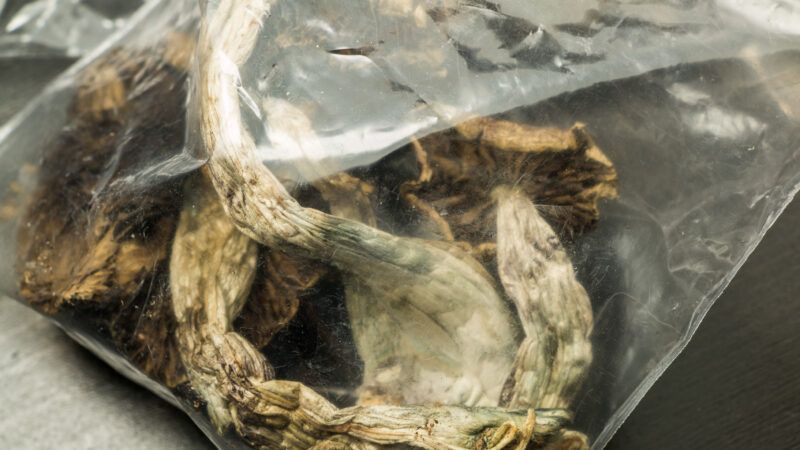California Lawmakers Approve Bill Decriminalizing Magic Mushrooms
Plus: The Biden administration weighs a "remain in Texas" policy, California slowly but surely reforms its housing-killing environmental review law, and more...

California might soon become the third state to decriminalize natural psychedelics. On Thursday, lawmakers in the state Senate approved S.B. 58, which removes criminal penalties for the personal possession and use of psilocybin-containing mushrooms, dimethyltryptamine (DMT), and mescaline by people 21 years and older.
The state Assembly approved the bill on Wednesday.
"California's veterans, first responders, and others struggling with PTSD, depression, and addiction deserve access to these promising plant medicines," state Sen. Scott Wiener (D–San Francisco), the bill's author, said in a statement to the Los Angeles Times. "It's time to stop criminalizing people who use psychedelics for healing or personal well-being."
The bill would also require the California Health and Human Services Agency to convene a working group to study a regulatory framework for the therapeutic use of decriminalized psychedelics.
Two states, Oregon and Colorado, have already passed laws decriminalizing some psychedelics. Voters in Washington, D.C., also approved a ballot measure directing law enforcement to "deprioritize" enforcement of laws against psychedelics.
Oregon has also created a program whereby people can take these substances in the presence of a state-licensed "facilitator." That program launched in January. As of May, there are five of these licensed trip centers open for business.
Reason recently released a documentary on a massive psychedelics conference in Colorado, where scientists, psychonauts, capitalists, and comedians all gathered to make the case for their use.
California's road to decriminalizing psychedelics has been a long one. In 2019, Oakland became the first city in the state, and the second city in the country behind Denver, to pass an initiative decriminalizing these substances.
But activists failed in the following year to get enough signatures to place a statewide psychedelics decriminalization measure on the ballot.
Last year, a decriminalization bill proposed by Wiener also failed in the Legislature. The original bill would have legalized LSD (acid) and MDMA (ecstasy) as well as other "natural psychedelics," but it ended up being "gutted" by amendments, and never passed the full Legislature.
This year's bill produced strange coalitions of supporters and opponents. It received the support of a number of veterans groups interested in the therapeutic potential of psychedelics. Several Republican legislators in the state were also won over to the bill. Four of the Assembly's 13 Republican members voted for S.B. 58, reports The Wall Street Journal.
On the flip side, the bill split Democrats. A number of liberal legislators either voted against the bill or abstained. Some 22 members of the Assembly abstained, as did five members of the Senate.
S.B. 58 now goes to Democratic Gov. Gavin Newsom's desk for a signature. The governor hasn't said whether he'll sign the bill or not. He's vetoed other drug decriminalization measures in the past, including a bill that would have legalized "safe injection sites."
FREE MOVEMENT
President Joe Biden is considering a "remain in Texas" policy to stem the tide of new migrants entering the United States. The Los Angeles Times reports:
The Biden administration is considering forcing some migrant families who enter the country without authorization to remain near the border in Texas while awaiting asylum screening, effectively limiting their ability to travel within the United States, three U.S. officials told The Times.
Administration officials have been considering the idea as a way to stem recent increases in the numbers of migrant families crossing the southern border, which reportedly reached an all-time high last month. Supporters of the remain-in-Texas idea, which has yet to be finalized, hope that it would help the administration advance its goals of quickly deporting families who fail initial asylum screenings and deterring other families from crossing in the first place.
FREE MARKETS
Slowly but surely, California is paring back onerous environmental reviews of new housing projects. Earlier this month, Newsom signed into law a bill that would relieve local governments of having to produce duplicative studies on affordable housing projects they undertake.
Under the old regime, localities would have to study the impact of new subsidized housing when issuing permits for the housing and when funding the new housing. They'll no longer have to take that latter step, reports CoStar.
Last month, the Legislature also approved a bill making it clear that noise impacts from residents of new housing were not an environmental impact that needed to be studied and mitigated as part of approving new units. That law is a direct response to Berkeley activists' successful use of state environmental law to halt student housing on the grounds that the new students would make a lot of noise.
QUICK HITS
• A Chinese real estate company has produced another $100 billion ghost city. This time it's in Malaysia.
• Police in Belgium busted up the country's largest tennis match–fixing racket.
• Plans for a brand new city outside the San Francisco Bay Area are dividing the state's normal coalition of pro–housing supply activists.
• Cuban authorities said they arrested 17 people for their involvement in an alleged human-trafficking ring that was sending young Cuban men to fight for Russia against Ukraine, reports Politico.
• Prison officials in Pennsylvania are saying that human error played a role in the escape of an inmate. It wasn't just mechanical failure.
• The White House is putting $50 million worth of renovations into a new-and-improved "situation room." The Associated Press reports that the renovated space "has a modern-but-vintage vibe."
Rent Free is a weekly newsletter from Christian Britschgi on urbanism and the fight for less regulation, more housing, more property rights, and more freedom in America's cities.


Show Comments (314)